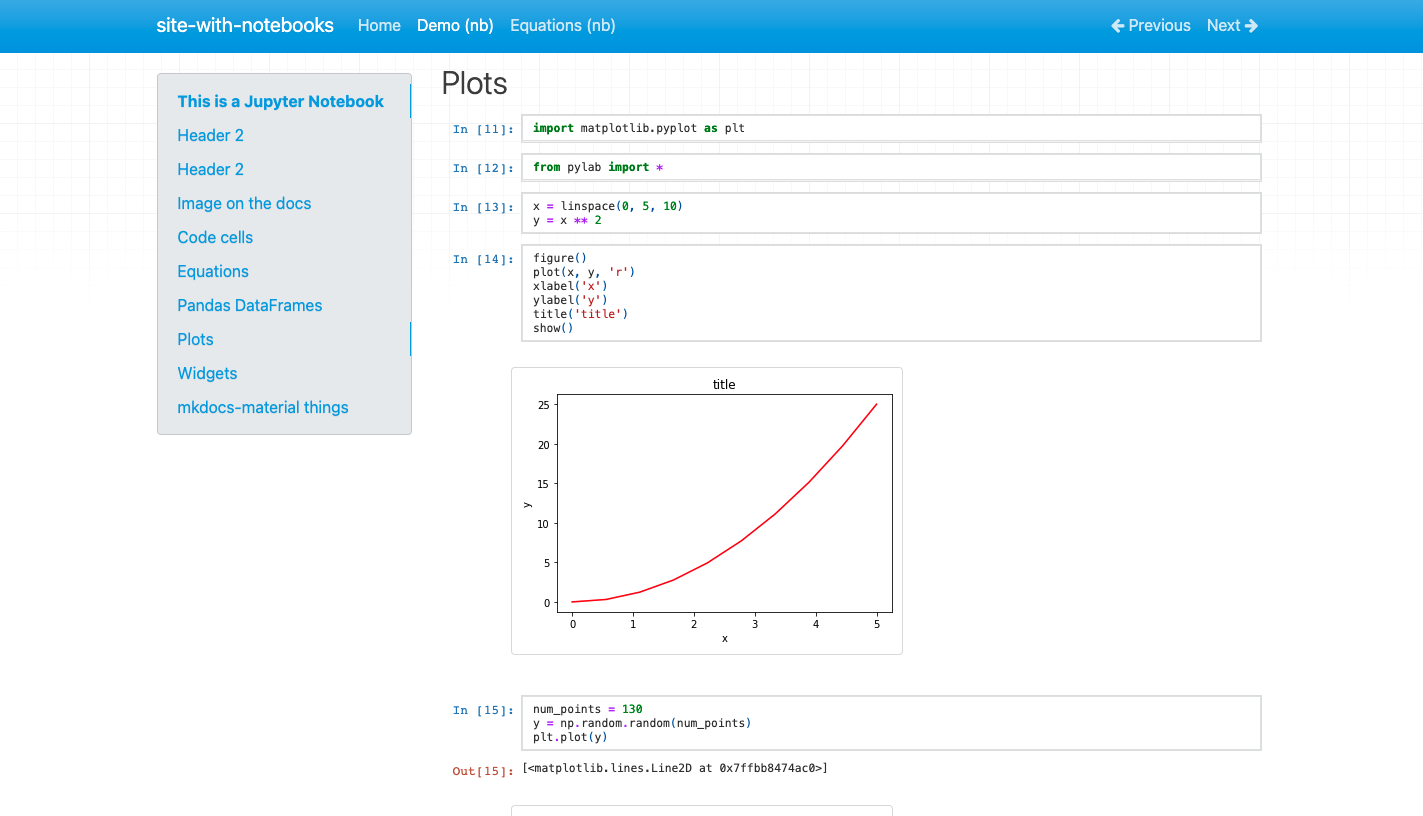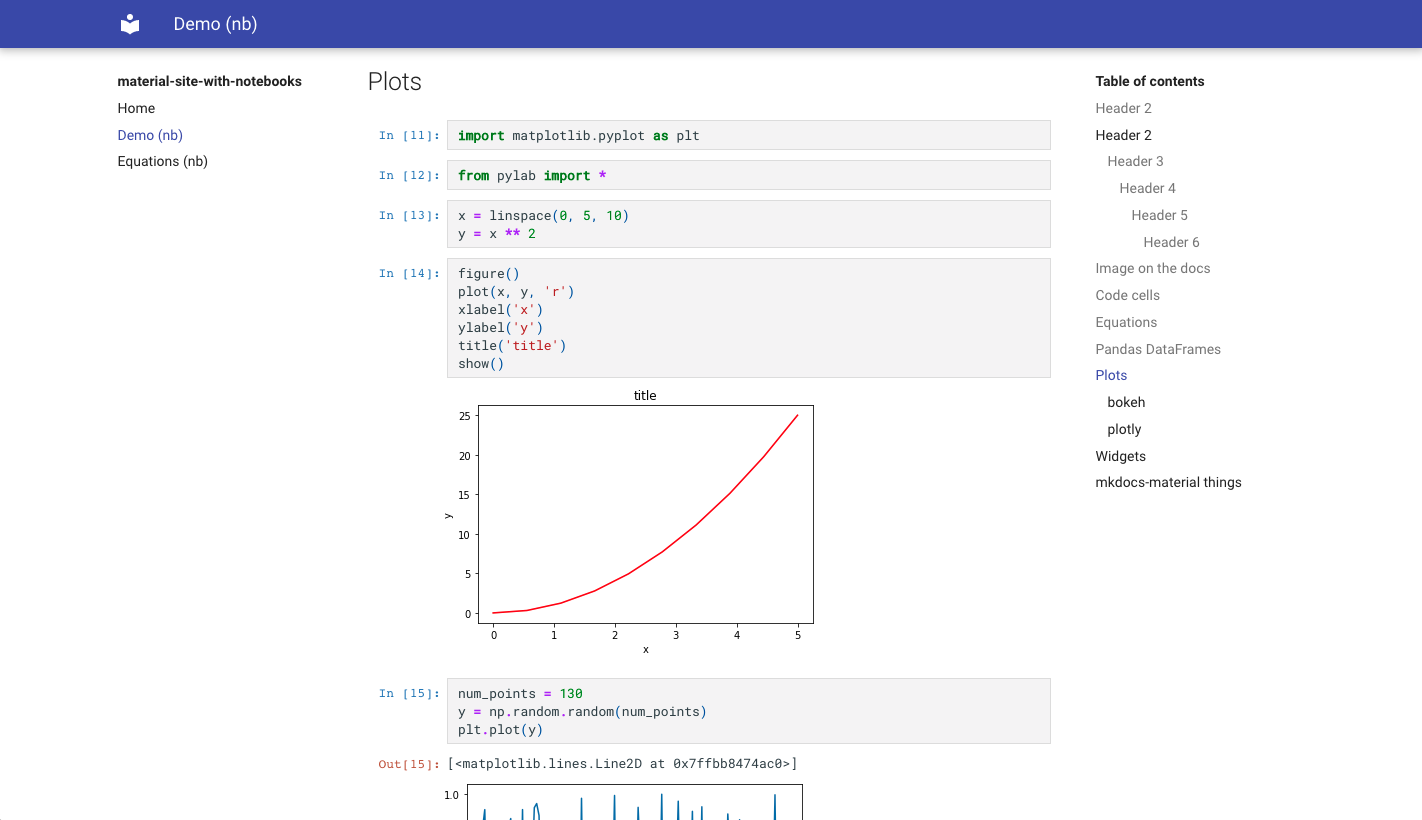https://github.com/danielfrg/mkdocs-jupyter
Use Jupyter Notebook in mkdocs
https://github.com/danielfrg/mkdocs-jupyter
blogging documentation jupyter jupyter-notebook mkdocs
Last synced: 10 months ago
JSON representation
Use Jupyter Notebook in mkdocs
- Host: GitHub
- URL: https://github.com/danielfrg/mkdocs-jupyter
- Owner: danielfrg
- License: apache-2.0
- Created: 2019-12-18T02:11:34.000Z (about 6 years ago)
- Default Branch: main
- Last Pushed: 2025-02-21T03:41:52.000Z (about 1 year ago)
- Last Synced: 2025-05-13T21:49:47.809Z (10 months ago)
- Topics: blogging, documentation, jupyter, jupyter-notebook, mkdocs
- Language: Jupyter Notebook
- Homepage: https://mkdocs-jupyter.danielfrg.com
- Size: 12.4 MB
- Stars: 442
- Watchers: 5
- Forks: 55
- Open Issues: 43
-
Metadata Files:
- Readme: README.md
- Changelog: CHANGELOG.md
- Contributing: CONTRIBUTING.md
- License: LICENSE.txt
Awesome Lists containing this project
- best-of-jupyter - GitHub - 30% open · ⏱️ 22.10.2025): (Notebook Sharing & Conversion)
- awesome-jupyter-resources - GitHub - 22% open · ⏱️ 04.05.2022): (Jupyter-Notebook分享与格式转换)
README

# mkdocs-jupyter: Use Jupyter Notebooks in mkdocs
- [Docs demo Site](https://mkdocs-jupyter.danielfrg.com/)
- Add Jupyter Notebooks directly to the mkdocs navigation
- Support for multiple formats:
- `.ipynb` and `.py` files (using
[jupytext](https://github.com/mwouts/jupytext))
- Same style as regular Jupyter Notebooks
- Support Jupyter Themes
- Option to execute the notebook before converting
- Support for [ipywidgets](https://github.com/jupyter-widgets/ipywidgets)
- Support for mkdocs TOC
- Option to include notebook source
## Installation
```shell
pip install mkdocs-jupyter
```
## Configuration
In the `mkdocs.yml` use Jupyter notebooks (`.ipynb`) or Python scripts (`.py`)
as pages:
```yaml
nav:
- Home: index.md
- Notebook page: notebook.ipynb
- Python file: python_script.py
plugins:
- mkdocs-jupyter
```
### Titles and Table of Contents
The first h1 header (`#`) in your notebook will be used as the title.
```md
# This H1 header will be the the title.
```
This can be turned off in the configuration (in which case the filename will be
used as title):
```yaml
plugins:
- mkdocs-jupyter:
ignore_h1_titles: True
```
In order to see the table of contents you need to maintain a hierarchical
headers structure in your notebooks. You must use h2 headers (`##`) and not h1
(`#`)
```md
## This H2 title will show in the table of contents
```
If you want to **nest headers** in the TOC you need to add additional levels
later in the same markdown cell or new bottom markdown cells:
```md
## This header will show as top level in the table of contents
### This one will be displayed inside the above level
```
### Including or Ignoring Files
You can control which files are included or ignored via lists of glob patterns:
```yaml
plugins:
- mkdocs-jupyter:
include: ["*.ipynb"] # Default: ["*.py", "*.ipynb"]
ignore: ["some-irrelevant-files/*.ipynb"]
```
### Execute Notebook
You can tell the plugin to execute the notebook before converting, default is
`False`:
```yaml
plugins:
- mkdocs-jupyter:
execute: true
```
You can tell the plugin to ignore the execution of some files (with glob
matching):
```yaml
plugins:
- mkdocs-jupyter:
execute_ignore:
- "my-secret-files/*.ipynb"
```
To fail when notebook execution fails set `allow_errors` to `false`:
```yaml
plugins:
- mkdocs-jupyter:
execute: true
allow_errors: false
```
#### Kernel
By default the plugin will use the kernel specified in the notebook to execute
it. You can specify a custom kernel name to use for all the notebooks:
```yaml
plugins:
- mkdocs-jupyter:
kernel_name: python3
```
### Ignore Code Input
By default the plugin will show full code and regular cell output details. You
can hide cell code input for all the notebooks:
```yaml
plugins:
- mkdocs-jupyter:
show_input: False
```
You can also decide to hide the `Out[#]` output notation and other cell metadata
for all the notebooks:
```yaml
plugins:
- mkdocs-jupyter:
no_input: True
```
### Remove Cell Using Tags
By default the plugin will show full code and regular cell output details. You
can hide cell code input for specific cells using tags:
```yaml
plugins:
- mkdocs-jupyter:
remove_tag_config:
remove_input_tags:
- hide_code
```
More detailed on removing cell based on tag, see [NbConvert
Customization](https://nbconvert.readthedocs.io/en/latest/removing_cells.html))
### Jupyter themes
You can configure the different Jupyter themes. For example if using material
with `slate` color scheme you can use the Jupyter Lab `dark` theme:
```yml
plugins:
- mkdocs-jupyter:
theme: dark
theme:
name: material
palette:
scheme: slate
```
### Extra CSS classes
This option will add a custom CSS class to the `div` container that highlights
the code cells. This can be useful to add custom styles to the code cells.
```yml
plugins:
- mkdocs-jupyter:
highlight_extra_classes: "custom-css-classes
```
### RequireJS
By default RequireJS is not loaded. This is required for Plotly.
You can enable it with:
```yml
plugins:
- mkdocs-jupyter:
include_requirejs: true
```
### Download notebook link
You can tell the plugin to include the notebook source to make it easy to show a
download button in the theme, default is `False`:
```yml
plugins:
- mkdocs-jupyter:
include_source: True
```
This setting will also create a `page.nb_url` value that you can use in your
theme to make a link in each page.
For example in `mkdocs-material` (see
[customization](https://squidfunk.github.io/mkdocs-material/customization/#overriding-template-blocks)),
you can create a `main.html` file like this:
```jinja
{% extends "base.html" %}
{% block content %}
{% if page.nb_url %}
{% include ".icons/material/download.svg" %}
{% endif %}
{{ super() }}
{% endblock content %}
```

## Styles
This extensions includes the Jupyter Lab nbconvert CSS styles and does some
modifications to make it as generic as possible in order for it to work with a
variety of mkdocs themes. This is not always possible and the theme we test the
most is [mkdocs-material](https://squidfunk.github.io/mkdocs-material).
It's possible you might need to do some CSS changes to make it look as good as
you want, for example for the material theme take a look at their [customization
docs](https://squidfunk.github.io/mkdocs-material/customization/#overriding-template-blocks).
Create a `main.html` file like:
```jinja
{% extends "base.html" %}
{% block content %}
{{ super() }}
// Do whatever changes you need here
.jp-RenderedHTMLCommon p {
color: red
}
{% endblock content %}
```
## Mkdocs Material notes
Any markdown specific features such as
[admonitions](https://squidfunk.github.io/mkdocs-material/reference/admonitions/)
won't work with mkdocs-jupyter because those features are not supported by
Jupyter itself and we use [nbconvert](https://nbconvert.readthedocs.io/) to make
the conversion.
To use this type of features you have to define the HTML directly in the
markdown cells:
```html
Note
If two distributions are similar, then their entropies are similar,
implies the KL divergence with respect to two distributions will be
smaller...
```




